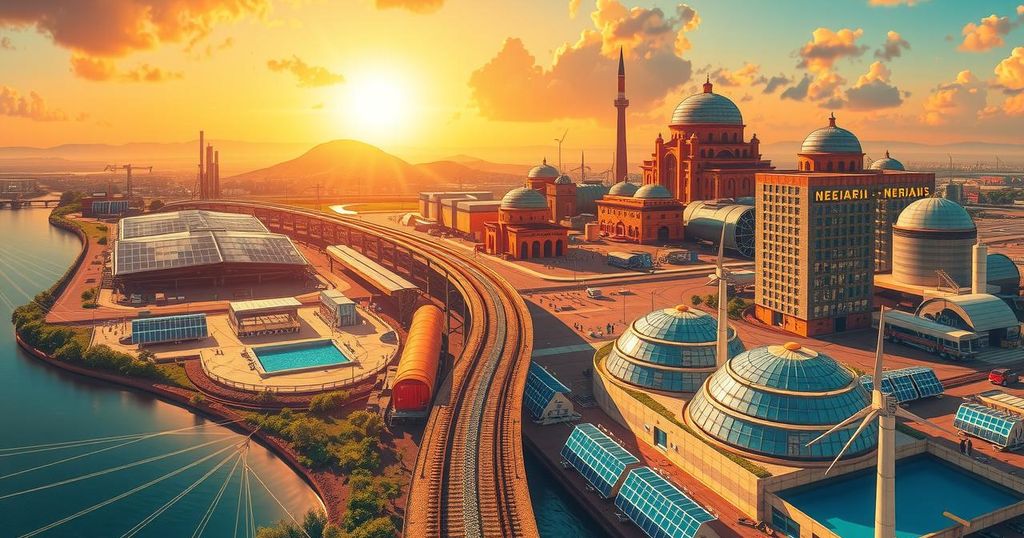Business
economics
ADESINA, AFRICA, AFRICAN DEVELOPMENT BANK, AKINWUMI, AKINWUNMI ADESINA, BO, BOLA TINUBU, BRETTON WOODS, COMPRESSED NATURAL GAS, ECONOMY, EXCHANGE RATE, GOVERNMENT INTERVENTION, IMPIC, INDEPENDENT MEDIA AND POLICY INITIATIVE, INFLATION, INTERNATIONAL MONETARY FUND, JANUS, NIGERIA, SOUTH KOREA, TINUBU, WORLD BANK
Leila Ramsay
0 Comments
Urgent Economic Measures Needed to Address Nigeria’s Crisis
Nigeria’s economy struggles as GDP per capita dwindles. Urgent reforms are needed to address inflation, subsidies, and living costs. The government must invest in energy, water, and transport sectors while ramping up manufacturing capacities. Effective security measures against terrorism are also vital. Comprehensive strategies are necessary for equitable resource distribution and economic growth.
The economic situation in Nigeria is dire, prompting urgent measures from the government. Dr. Akinwunmi Adesina, the President of the African Development Bank, made a stark comparison between Nigeria’s GDP per capita in 1960, which he stated was $1,857, and the current $824 projected for 2024. This contrasts sharply with South Korea’s impressive rise from $158 to $36,157 over the same period. Although the Independent Media and Policy Initiative contest Adesina’s claim, neither party has provided clear sourcing for these figures.
As President Bola Tinubu approaches the mid-term of his presidency, economic indicators reveal worsening conditions for the populace, compounded by rising inflation and inadequate living standards. The liberal economic solutions proposed by organizations like the World Bank and International Monetary Fund are believed to be crucial for stabilizing Nigeria’s economy, which has been weakened by subsidy burdens on fuel and electricity.
Inflation rates and the depreciation of the naira against the dollar have further escalated living costs, making essentials less affordable for many Nigerians, pushing them deeper into poverty. The criticism from both domestic and international observers highlights a disconnect in the responses to economic reforms. While Bretton Woods institutions advocate for market-driven policies, they also express concern over the implementation of these reforms in Nigeria.
One might note the government’s apparent reluctance to put into action significant remedial policies. Effectively, besides temporary cash allowance and food palliatives that reach only a fraction of those in need, there has been little substantial assistance. The government appears fatigued, failing to boost crude production and implement alternative energy solutions satisfactorily.
As the nation gears up for the 2027 elections, rapid action is essential, including laying the groundwork for a comprehensive economic recovery plan. This plan could take the form of investment in renewable energy initiatives, expanding solar energy projects beyond the Presidential Villa to public institutions and healthcare facilities. Such actions could create broader access to energy while supporting state-run energy enterprises in the process.
State governments should also prioritize upgrading water facilities to ensure clean water access for residents and industries alike, while rail transport investments could enhance the connectivity of rural agricultural areas with urban centers. This could help boost the agricultural sector by reviving traditional farm settlements.
Furthermore, the economic framework needs a paradigm shift from an import-dependent model to a locally driven industrial capacity. This could involve the establishment of both private and public manufacturing plants tailored to produce necessary machinery and raw materials domestically. Heavy industries, such as automobile manufacturing, should also receive government backing to create sustainable employment opportunities, especially for young people entering the job market.
The Nigerian government must take its naira-for-petroleum policy seriously, promoting local production and reducing foreign exchange pressure. Clearer pathways must also be established to meet the crude oil production targets set forth by the Federal Government and the Nigerian National Petroleum Company Limited.
Moreover, addressing insecurity and terrorism must be prioritized through coordinated military efforts, alongside assessing ECOWAS protocols regarding border controls. Nigeria’s military, once a pillar of regional stability, appears strained against the current threats stemming from the Sahel region.
Consensus and collaboration among all governance levels are imperative for implementing these economic strategies effectively. The Financial Minister has targeted a seven percent annual GDP growth to realize President Tinubu’s vision of a $1 trillion economy by 2030. However, equitable distribution of resources is equally vital, as the severe wealth gap between the affluent and the impoverished escalates social injustices.
State governors, benefiting from recent higher allocations due to subsidy removals, must actively contribute to alleviating poverty and improving living conditions while ensuring fair remuneration for workers. Ultimately, Nigerian governments must pursue policies that bolster economic performance and foster equitable resource distribution, preparing the nation for more formidable economic growth.
In summary, Nigeria faces significant economic challenges that necessitate immediate action from the government. Urgent measures must include investments in energy, water, and transportation, alongside a shift toward local manufacturing and sustainable job creation. Security remains a critical issue that must be addressed in tandem with economic strategies. Overall, improving the economy requires a concerted effort from all levels of government to ensure equitable growth and resource distribution.
Original Source: punchng.com




Post Comment